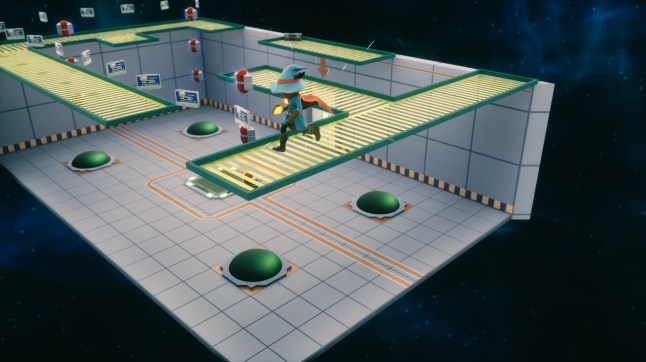
Head Over Heels, Treasure Island Dizzy, Attack Of The Mutant Camels, Jet Set Willy, and more are celebrated in this love letter to UK retro gaming.
Retro gaming is now so ingrained in the market that it no longer feels like a niche, but more like a mainstream sector of the industry. The average age of gamers is getting older and older, which makes nostalgia a useful pitch for developers looking to mine a few ideas from the good old days. Retro is often no more than skin deep though, with plenty of modern games opting for pixel art styling, even though their gameplay is nothing like the 16-bit games they resemble.
The original Lumo is now almost a decade old and took rather a different approach. It looked like a modern take on ZX Spectrum classic Knight Lore, presenting its levels as charming isometric rooms hanging in space. Its sequel starts with much the same premise and once again ignores old school visuals in favour of crisp 4K graphics.
At the start, you’re once again sucked into a video game and returned to the 1980s, your wizard hat-wearing avatar beginning the game itself next to the yolky corpse of 8-bit video game mascot, Dizzy. It’s the first of a cornucopia of throwback references that take in games, their developers, and bygone media that will have been formative for anyone over the age of 40.
It’s also resoundingly British and one of very few games to feature both Welsh and Gaelic language options, alongside English, which is represented by the Union Flag rather than the Stars and Stripes. Like Rare’s games before they were bought out and sanitised by Microsoft, it has an offbeat sense of humour that just doesn’t exist outside this sceptred isle.
While it starts with the isometric view favoured by its predecessor, levels come in all sorts of varieties, from side-on 2D platforming, to a refreshed take on Space Harrier, where rather than shooting space dragons, you’ll be blasting constellations of floppy disks, cassette tapes, and the floating head of Kevin Toms, creator of the Football Manager series, who returns fire with – appropriately enough – footballs.
The references arrive thick and fast. Dr Who’s TARDIS, Jet Set Willy, War Games, Nebulus, Marble Madness, Head Over Heels Ant Attack, Uridium, and the rainbow-hewn logos of Jeff Minter’s Llamasoft all have their moment of glory before disappearing again. But even if you are an older gamer and British media junkie, you get the feeling you’re missing at least as many references as you understand, given the frequency and occasional subtlety of their inclusion.
Expert, exclusive gaming analysis
Sign up to the GameCentral newsletter for a unique take on the week in gaming, alongside the latest reviews and more. Delivered to your inbox every Saturday morning.
Part of recreating early video games is the challenge of alluding to their rock hard difficulty levels, without making them equally brutal. In Lumo 2 you will find yourself being returned to the beginning of levels with alarming frequency, but the frustration that might otherwise cause is lightened by making your progress permanent. No matter how many times you die, you’re always whittling away at the collectibles you need without repeatedly having to start from scratch.
This does leave trace elements of annoyingly repetitive deaths, though, to the extent that there’s a trophy for dying 20 times in a single room, but since every idea, and elderly game it uses as inspiration, appears only once it’s impossible to stay irritated for long, before you’re on to the next madcap reference. Like a joke falling flat in The Naked Gun, there are so many being fired your way that you’re on to the next one almost before you have a chance to register disappointment.
What is clear, though, is that there’s a reason isometric platform games never took off, which is the fundamental trickiness of trying to judge jumps accurately from a forced-3D, fixed camera perspective. Your character’s little circular shadow helps a bit, but your viewpoint makes some of Lumo 2’s levels more tooth-grinding than you might prefer. They’re far from impossible, and most have generous checkpointing, but it’s still irksome. When you do finally get given control of the camera, it’s a huge relief.

Along with finding each area’s main collectibles, there are rubber ducks to unlock and extract, their key distinction from other items being your inability to jump while carrying one, making the route to the door even more of a puzzle than your way to grab the duck in the first place. Their cheap-sounding squeaky noises bely the sometimes intense difficult spikes associated with collecting them.
There are also boom boxes that trigger a collection of cassette tapes appearing on-screen. They need to be collected in sequence against a timer, and unfortunately often serve to underline the unnecessary difficulty associated with fixed camera platforming. But since they’re optional you can decide for yourself how much you care about that particular trophy hunt.
While Lumo 2 is perfectly accessible to any age group, provided you enjoy a sometimes taxing platform challenge, to get the very most out of it you’ll need to appreciate at least a good proportion of its quick-fire references. Despite a few momentary difficulty spikes, Lumo 2 is an enjoyably idiosyncratic trip down memory lane. Like all nostalgia, it feels hollow at times but since the games its paying tribute to don’t usually get a modern airing that’s very easy to forgive.
Lumo 2 review summary
In Short: A nostalgia trip with a distinctly British flavour, that blends various brands of platform gaming with references to 1980s games, films, and TV shows – and despite some frustrations keeps it accessible for every age of gamer.
Pros: Pleasingly weird and filled with references to classic games that never usually get mentioned nowadays. Neat graphics and some genuinely interesting and challenging puzzles.
Cons: Some annoying difficulty spikes and isometric platforming remains a chore, and undoubtedly less appealing if you don’t get any of the game’s references.
Score: 7/10
Formats: PlayStation 5 (reviewed), Nintendo Switch, Xbox Series X/S, and PC
Price: £19.99
Publisher: Numskull Games
Developer: Triple Eh?
Release Date: 17th October 2025
Age Rating: 7

Email gamecentral@metro.co.uk, leave a comment below, follow us on Twitter.
To submit Inbox letters and Reader’s Features more easily, without the need to send an email, just use our Submit Stuff page here.
For more stories like this, check our Gaming page.




This post captures the charm of 80s UK video games beautifully! It’s great to see a review that pays tribute to such classic titles. Lumo 2 seems like a fun homage to that nostalgic era.